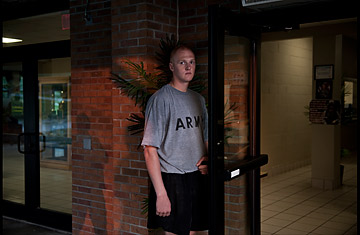
A recruit at Fort Jackson holds open the door to the mess hall during breakfast hours.
(3 of 8)
Consider the numbers: the Army, which accounts for 40% of the nation's active-duty force, has moved largely to the Sun Belt over the past generation. It is now concentrated in Georgia, Kentucky, North Carolina, Texas and Washington State. The degree of isolation doesn't lessen much when you add the Navy and Air Force: thanks mostly to consolidations arising from base closings, 10 states are home to 70% of all Americans in uniform. The U.S. military has abandoned New England and the Midwest; more active-duty troops--some 13,000--are stationed in tiny Washington, D.C., than in Connecticut, Indiana, Massachusetts, Minnesota, Michigan, New Jersey, Ohio, Pennsylvania or Wisconsin. Recruiters have followed suit: Alabama has 10 Army Reserve Office Training Corps programs serving a state with fewer than 5 million people. Greater Los Angeles, with 12 million people, has only four. The Chicago region--population 9 million--has three.
"Propensity to serve is most pronounced in the South and the Mountain West and in rural areas and small towns nationwide," observed former Defense Secretary Robert Gates last month. "The percentage of the force from the Northeast, the West Coast and major cities continues to decline." Partly as a result, the job of putting on the uniform has become an almost tribal one: a growing share of active-duty troops has a sibling or had a parent in uniform; close to 100,000 troops are married to another service member. The number of cadets at the U.S. Military Academy who have a parent who also attended West Point has grown by 50% in the past generation. "It's a family business, and it's a very tough time to be in the family business," says Dave Barno, a retired Army lieutenant general who commanded all allied troops in Afghanistan in 2003--04 and has two sons in the Army. "As my kids deploy around the world, they're running into their playmates from when they were growing up, at Fort Leavenworth and Fort Lewis, in Kandahar and Jalalabad," he says. "Their classmates as kids on military bases are the people they're fighting with."
The separation is enforced by a garrison culture that goes back generations but has deepened in recent years as a result of the nation's decision to close unneeded military posts and pay service members more. Many troops and their families live on such megabases and have no need to leave: they shop at on-base commissaries, have their babies at on-base hospitals and send their kids to on-base schools. They're younger and fitter than the nation's civilian population as a whole and are largely immune to the economic insecurities plaguing so many other Americans. Barno calls military life on post a "golden cocoon" that insulates troops from the rest of us. "There's a different flavor when you're living outside the gates," he says. Out there, "when you go to church, everyone isn't 25 to 35 with short haircuts, with big biceps--you see people who are infirm or aged, facing other challenges in their lives, and so you get a different sense of life."
